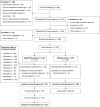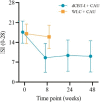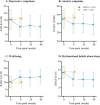The clinical effects of digital cognitive behavioral therapy for insomnia in a heterogenous study sample: results from a randomized controlled trial
- PMID: 37428712
- PMCID: PMC10636251
- DOI: 10.1093/sleep/zsad184
The clinical effects of digital cognitive behavioral therapy for insomnia in a heterogenous study sample: results from a randomized controlled trial
Abstract
Study objectives: Numerous studies worldwide have reported the beneficial effects of digital cognitive behavioral therapy for insomnia (dCBT-I). However, few focus on real-world study samples that reflect people in regular care. To test whether dCBT-I is suitable within German regular care, we designed a randomized controlled trial recruiting a heterogenous insomnia population.
Methods: Participants aged ≥18 who met the criteria for insomnia disorder were randomized to 8-weeks dCBT-I + care-as-usual (CAU) or they were set on a waitlist + CAU. The intervention group was followed-up at 6- and 12-months. The primary outcome was self-reported insomnia severity, assessed with the Insomnia Severity Index (ISI) at 8-weeks post-randomization. A one-way ANCOVA with baseline score as a covariate was fitted to determine group differences. Secondary outcomes included measures of daytime functioning, quality of life, depression, anxiety, dreams, and nightmares.
Results: Of the N = 238 participants (67.6% female), age range 19-81 years, n = 118 were randomized to dCBT-I and n = 120 to the control group. At posttreatment, the use of dCBT-I was associated with a large reduction in the ISI (Diffadj = -7.60) in comparison to WLC (d = -2.08). This clinical improvement was also reflected in responder and remission rates. Treatment effects were also observed for daytime functioning, quality of life, symptoms of depression and anxiety (ds = 0.26-1.02) and at long-term follow-up (intervention group only; ds = 0.18-1.65). No effects were found for dream and nightmare frequency.
Conclusions: This study showed that dCBT-I reduces insomnia symptoms and improves daytime functioning in a heterogenous insomnia population in Germany with sustained long-term treatment effects in the intervention group. Our results underscore the potential of digital health applications, their suitability within regular care, and their role in facilitating widespread implementation of CBT-I as a first-line treatment for insomnia.
Keywords: CBT-I; RCT; cognitive behavioral therapy for insomnia; dCBT-I; digital health; digital therapy; insomnia; randomized controlled trial; regular care; sleep.
© The Author(s) 2023. Published by Oxford University Press on behalf of Sleep Research Society.
Figures




Similar articles
-
Digital CBT-I in Comorbid Insomnia and Depression: Clinical Outcomes From a Pragmatic Randomized Controlled Trial.Depress Anxiety. 2025 May 26;2025:2171041. doi: 10.1155/da/2171041. eCollection 2025. Depress Anxiety. 2025. PMID: 40458292 Free PMC article. Clinical Trial.
-
Effect of Digital Cognitive Behavioral Therapy for Insomnia on Health, Psychological Well-being, and Sleep-Related Quality of Life: A Randomized Clinical Trial.JAMA Psychiatry. 2019 Jan 1;76(1):21-30. doi: 10.1001/jamapsychiatry.2018.2745. JAMA Psychiatry. 2019. PMID: 30264137 Free PMC article. Clinical Trial.
-
Effects of digital cognitive behavioural therapy for insomnia on insomnia severity: a large-scale randomised controlled trial.Lancet Digit Health. 2020 Aug;2(8):e397-e406. doi: 10.1016/S2589-7500(20)30135-7. Lancet Digit Health. 2020. PMID: 33328044 Clinical Trial.
-
Digital Delivery of Cognitive Behavioral Therapy for Insomnia.Curr Psychiatry Rep. 2019 Jun 4;21(7):50. doi: 10.1007/s11920-019-1041-0. Curr Psychiatry Rep. 2019. PMID: 31161406 Free PMC article. Review.
-
The efficacy of digital cognitive behavioral therapy for insomnia and depression: a systematic review and meta-analysis of randomized controlled trials.PeerJ. 2023 Oct 31;11:e16137. doi: 10.7717/peerj.16137. eCollection 2023. PeerJ. 2023. PMID: 37927792 Free PMC article.
Cited by
-
Applying a mobile intervention for chronic insomnia in routine care: Study protocol for a multicenter randomized controlled trial.Internet Interv. 2025 Jun 20;41:100848. doi: 10.1016/j.invent.2025.100848. eCollection 2025 Sep. Internet Interv. 2025. PMID: 40636932 Free PMC article.
-
Effectiveness of Information and Communication Technology-Based Cognitive Behavioral Therapy Using the Smart Sleep App on Insomnia in Older Adults: Randomized Controlled Trial.J Med Internet Res. 2025 Jun 25;27:e67751. doi: 10.2196/67751. J Med Internet Res. 2025. PMID: 40561473 Free PMC article. Clinical Trial.
-
Digital and AI-Enhanced Cognitive Behavioral Therapy for Insomnia: Neurocognitive Mechanisms and Clinical Outcomes.J Clin Med. 2025 Mar 26;14(7):2265. doi: 10.3390/jcm14072265. J Clin Med. 2025. PMID: 40217715 Free PMC article. Review.
-
Design of a Mobile App and a Clinical Trial Management System for Cognitive Health and Dementia Risk Reduction: User-Centered Design Approach.JMIR Aging. 2025 Jul 2;8:e66660. doi: 10.2196/66660. JMIR Aging. 2025. PMID: 40601924 Free PMC article. Clinical Trial.
-
Innovative Digital Cognitive Behavioral Treatment for Insomnia Disorder in Adults (dCBT-i): Framework Development.JMIR Hum Factors. 2025 May 27;12:e70193. doi: 10.2196/70193. JMIR Hum Factors. 2025. PMID: 40424031 Free PMC article.
References
Publication types
MeSH terms
Grants and funding
LinkOut - more resources
Full Text Sources
Medical
Miscellaneous

